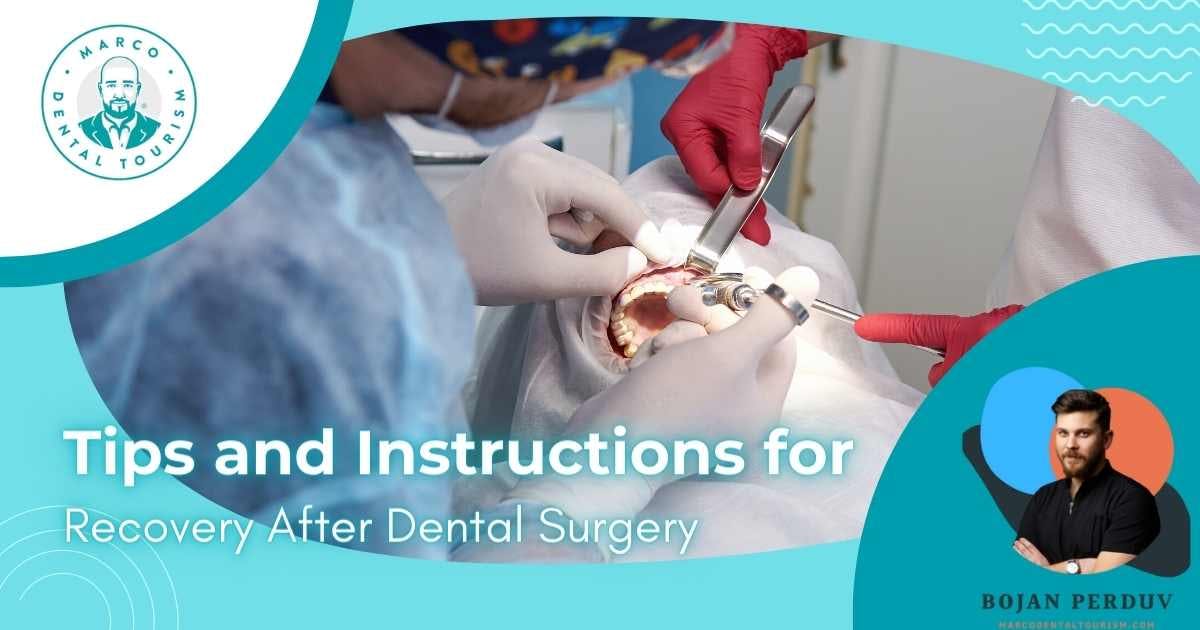Recovery after the dentist

We understand that recovery from a dental procedure can be long and sometimes very exhausting for the patient, but luckily it doesn't always have to be that way. That's why in this blog we deal with care after various dental procedures, and we also give you advice on how to successfully and promptly return to your daily duties and routines. We discuss the importance of dental health care and what to do to make recovery as easy and painless as possible. So join us and find out all the necessary information and recommendations that will make the period after the intervention more carefree and comfortable.
What does recovery mean after a dental procedure?

Recovery after a dental procedure means returning to a state of optimal dental health. With proper care and rest, it is possible to return to daily activities and enjoy a better quality of life. It is important to follow your dentist's advice to achieve a successful and speedy recovery.
How long does it take to get back to normal routines?
Recovery time always depends on the type of dental procedure. It is common for recovery to take up to two days. However, for more invasive procedures, your dentist may advise you to wait longer before returning to your regular routine. Be sure to follow your doctor's instructions for best results.

Recovery after tooth extraction varies, but usually takes 7-10 days. Follow your dentist's instructions carefully when taking pain relievers and use cold compresses to reduce swelling. Eat soft foods and stay hydrated to ensure a carefree and comfortable recovery.
How to reduce swelling after dental surgery?

To reduce swelling after dental surgery at home, try applying a compress to the affected area for 15 minutes. Ice reduces inflammation and can help relieve pain. Avoid strenuous activity, take prescribed medication, stay hydrated and be sure to rest.
What is a tooth resection?

Tooth resection or apicotomy is a dental procedure that removes the tip or root of a tooth that is damaged or infected. This procedure helps preserve the remaining healthy tooth structure and prevents further infection. It is a safe way of treating dental problems that effectively restores tooth function.
How to recover after tooth root resection?

After a successful tooth root resection, it is equally important to follow the recovery instructions after the intervention.
Here are some key steps:
- Avoid hard, spicy and crunchy foods: Avoid eating hard and crunchy foods for a few days after the dental procedure to protect the sensitive area of the tooth from pain and discomfort.
- Take exactly prescribed antibiotics and analgesics: Adequate therapy prescribed by the dentist greatly helps in preventing infection and further complications after each surgical procedure.
- Use cold compresses: Cold compresses, especially in the first days after the intervention, can reduce swelling and discomfort.
- Practice good oral hygiene habits: Brushing your teeth regularly, as well as rinsing your mouth from excess toothpaste, helps in a faster healing and recovery process. For completely painless healing, use gentle movements and a toothbrush with soft bristles.
- Listen to your dentist's advice: If necessary, schedule a follow-up appointment with your dentist after the intervention in order to monitor the healing process together without additional side effects.
Should physical activity be reduced after dental surgery?
Physical activity after the dental procedure should be limited in order to avoid excessive strain on the area. Light activities such as walking and stretching are completely safe. Talk to your dentist before engaging in more demanding activities such as running and other sports.
What are the best tips for recovery after dental procedures?

In order to feel ready and healthy for normal daily activities as soon as possible after any necessary intervention, we recommend:
- Rest: Give your body time to recover and get plenty of rest after each treatment procedure.
- Avoiding tobacco: Smoking can slow the healing process and increase the risk of side effects and complications.
- Eating soft foods: Eating soft, nutritious foods, such as fruit compote, can aid in the healing and regeneration process.
- Following your doctor's instructions: Follow your dentist's instructions for medication, brushing, flossing, and other dental care immediately after surgery.
- Regular oral and dental hygiene: Continue with healthy habits and regularly brush your teeth at least twice a day, keeping your mouth and breath fresh and clean.
Why is it important to follow the dentist's advice?
After dental surgery, it is important to follow your dentist's advice to ensure proper healing and reduce the risk of complications. Following the dentist's instructions helps to relieve pain, swelling and infections, and visits to the dentist allow all the threads to be removed in time.
We offer a few more reasons why expert advice is crucial:
- Faster recovery: Based on many years of experience, the dentist can provide the best way for a quick and successful recovery for each patient.
- Prevention: Relevant advice from a dentist helps prevent potential complications and doubts.
- Aftercare: Tips help plan aftercare and monitor progress after the procedure.
- Nutrition: The doctor's advice can contribute to easier and more painless chewing and swallowing of food, as well as the selection of the same.
- Preventing future dental problems: Following the instructions helps prevent future dental problems by minimizing the risk of them occurring.
- Reduce stress: Stress after surgery can slow recovery and can also increase pain and discomfort. The dentist's advice can help you feel more relaxed and calm, which will encourage faster and easier healing.
Conclusion

Recovery after dental surgery is a very important process that should be taken seriously and approached with dedication and thought. Not only does recovery time vary depending on the type of procedure, but it is also important to follow the care instructions prescribed by your dentist without neglecting proper home care. Taking time to rest, eating healthy, and practicing good oral hygiene will ensure an easy and comfortable recovery. With dedication and patience, you can quickly get back to enjoying the activities you love and that make you happy again.













Share your opinion!
What do you think about this topic?
Comments (0)